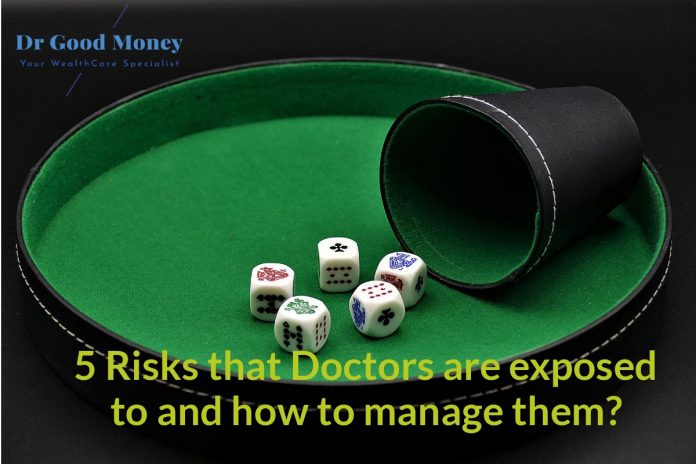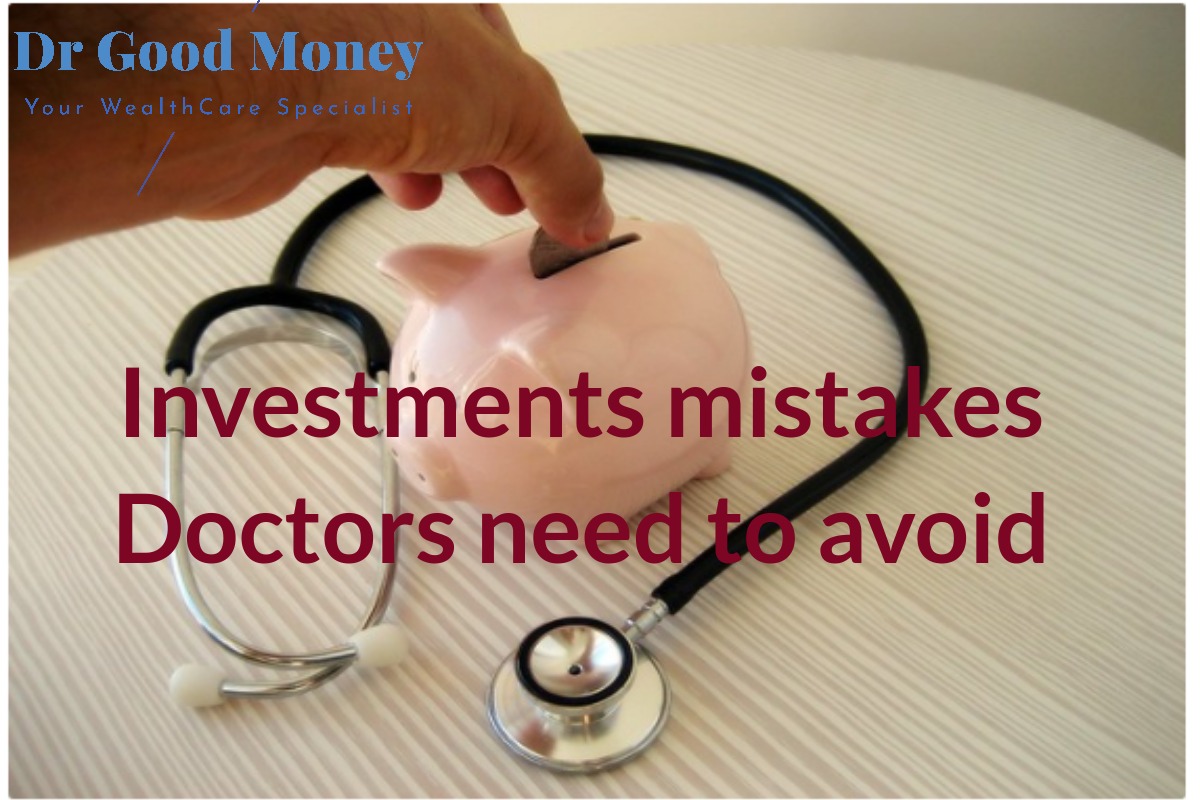Doctors are not immune to the risks. After all, you are also human. Though your profession may keep you from some financial pressures coming from the Income side, the health risk, and nowadays the legal risk too, which you are specifically exposed to, are enough to put pressure on your financials.
In fact, in corona times, we have seen even the income of the doctors taking a hit due to lesser walk in and OPDs in Hospitals and Clinics, Lockdown pressures which forced them to postpone surgeries and giving teleconsultations to non-serious patients at lower fees.
All this has resulted in depleting their savings as they have to continue with the EMI payments, house expenses, and other essential spendings.
That’s why this is important to understand what different kind of Risks Doctors are exposed to and how to manage the same.
Risk Can be managed in 3 ways – Risk Transfer, Risk Avoidance, Risk Acceptance.
Let us look at 5 Risks that Doctors are exposed to:
FREE Download
YOUR FINANCIAL DATA
RECORD KEEPER
Organize and Collate data at a Single Place for easy Access and Management
- Professional and Legal Risk:
A patient approaching a doctor expects medical treatment with all the knowledge and skill that the doctor possesses to bring relief to his medical problem. The relationship takes the shape of a contract retaining the essential elements of the tort. A doctor owes certain duties to his patient and a breach of any of these duties gives a cause of action for negligence against the doctor.
Expectations of a patient are two-fold: doctors and hospitals are expected to provide medical treatment with all the knowledge and skill at their command and secondly, they will not do anything to harm the patient in any manner either because of their negligence, carelessness, or reckless attitude of their staff.
Though a doctor may not be in a position to save his patient’s life at all times, he is expected to use his special knowledge and skill in the most appropriate manner keeping in mind the interest of the patient who has entrusted his life to him.
Though doctors take all the precautions and follow the protocols to discharge their duties but still there is always a scope of error and omission, after all at the end of the day they are also humans.
But the stakes are very high here. The patient’s life and health remain at risk in case of any negligence.
All said and done, this is major risk doctors are exposed to, its not only a Professional risk that may invite legal trouble, but it is also a Reputational risk too.
So, where doctors should be doubly cautious in discharging their duties by Accepting the risk, the Financial part of the Risk may be Transferred to the Insurance Companies through Professional Indemnity Policies.
Professional Indemnity Insurance provides the doctor, cover against the financial repercussions arising out of any claim on account of negligence, error, omission, mistakes, inadequate services or advice, etc. committed whilst rendering professional service. (Read more on Professional Indemnity Insurance here)
- Accident Risk:
Can you tell, what body injury could prove to be more fatal to a doctor? Though Permanent disability will definitely impact each and every person, temporary disability like- fractures impact most to the surgeons.
Of all medical specialties, surgeons are perhaps the most susceptible to a disabling injury or illness, one that would impact their ability to continue their profession.
There are some age-related illnesses too like arthritis or some Lifestyle diseases like Chronic pain in the back, neck, knees, feet, etc. can prevent surgeons from standing for procedures.
Not to mention what would happen if an injury was serious enough to cause loss of eyesight, a limb, or the ability to stand or move without a wheelchair.
So, what happens if, as a surgeon, you can no longer operate? What happens if you gradually, or even suddenly, lose the ability to earn your salary? Could you and your family continue the current lifestyle?
Accidents may come in any way, it’s not just when you are driving on road, but while taking a bath you may slip, while climbing stairs you may lose balance, while playing you may injure yourself.
Yes, it’s an emotional trauma, but the Financial Impact of the Injury could be devastating.
You may add Disability insurance in your insurance kitty and transfer some of the risks to Insurers, so as to protect a significant amount of income and all that your income supports, if you’re in a bad accident, lose your vision, or suffer an illness that affects your ability to perform procedures and treat patients.
(Read a detailed post on Personal Accident Insurance with infographics here)
In case of temporary disability, this cover will take care of the routine and regular expenses like home expenses, EMI payments, Children’s school fees, etc.
- Life and Health Risks:
This risk is something you are daily exposed to. Even if doing private practice, or working in hospitals, you expose yourself to many patients with many contagious and serious illness. And thus, also carries this risk home and may risk your Family also.
Though no one is safe on this front, doctors are more at risk, because of your nature of work.
After reaching a Comfortable stage in life, with decent savings and assets, generating passive income, you may say that you will manage the Financial risks coming along with health problems, but still, in the beginning of your career, you have lots to take care of.
Health insurance is to take care of it, so you need not dip into your savings at the time of a major health problem.
Life risk comes along with Health, Accident, Age, or sometimes with no reason at all. Who understands this better than a doctor? In such cases, you have to be fully protected through term life insurances so the financial responsibilities can be well-taken care for.
Life insurance is mainly for your Financial dependents, if you do not have any there is no need to get into such products. Remember these are not Investment instruments.
- Old Age Risks:
This is the stage when NO accident Policy Covers you. You may not be supported by your dependents as they may not be living with you. Your health is the only companion if it is in good shape makes your life well, else…
This risk cannot be Transferred to any Insurance company and neither can be avoided. It has to be accepted and managed well. Not just by trying to stay in good health but also the financial side of it to take care of your needs, wants, and desires.
Though we all see people getting old around us, you being a doctor have also closely seen the problems they face. The real picture of this stage has been presented by Dr. Atul Gawande in his Bestseller “Being Mortal”. It’s a Must read for all. That actually is the stage that we actually have to be prepared for and to plan for.
On the Financial side, there should be proper nominations in place in your bank and Investment accounts, better to have a joint account with your spouse. You have to have a major portion of money in the financial assets and less in Real assets, to manage the wealth properly in front of your eyes., and also plan for its distribution well.
You may consider going in for a Private Trust Structure so the financials get easily managed in case of yours being incapacitated, or not able to manage the financial matters due to other old age issues like Arthritis, Dementia, losing eyesight, shivering hands, etc.
- Investment Behaviour Risk:
I am mentioning this risk in the end, just to point out that Financial Planning is not just about making Investment. Just like Doctors are not only about medicines. All advisors’ job is to bring wellness in the life of the client/patient.
But when a patient keeps doubting the Doctors ability or keeps questioning his/her skills, and when the doctor is treating the patient as only another person, and curing illness as the only target rather than bringing wellness in a person’s life, the relationship does not last long.
I feel a financial planner’s role does not restrict only to make you invest (Read: Giving just medicine), but to try and handhold the client in the whole journey, guide on each and every possible step and be a coach of the financial life, then only the ultimate goal of bringing wellness in doctors life be achieved.
And this is done by managing and guiding on the Behaviour risk which all humans are exposed to. Doctors behave like their patients when it comes to Financial Management. (Read: How and when Doctors behave like their Patients)
Wanting Fast relief ( as in Fast Returns), Taking advice from Chemists ( as in Product distributors), Finding solutions in Medicines (Read Investments and Ignoring other aspects of diet, sleep and rest), Asking Questions to Web MD or any other websites, which confuse more and convince less (Read Money control, economic times, etc.)…and many more such behaviour issues that only a Trustworthy Financial planner by your side be able to guide on.
Conclusion:
Risk management works well when we can identify the specific risk and then find out the solution to Transfer, Avoid or Accept. Transferring should always be the first option and accepting be the last.
Every good financial management starts with managing the risk because the risk is real-time and returns are in hindsight and will be experienced in the future. So, first thing first, manage the risks, your half work is done.






